Natalya ZotovaBBC News Russian
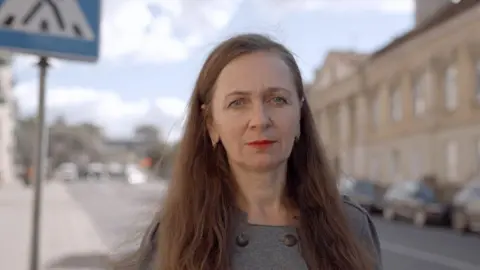 BBC
BBCLarysa would have been happier staying in prison for the final four months of her sentence, if she could have gone home at the end of it.
Instead she was bussed over the border from Belarus into Lithuania with 51 other political prisoners. They were released in September as part of a deal to relax sanctions hatched between Belarus’s authoritarian leader Alexander Lukashenko and US President Donald Trump.
During the three years she spent behind bars for “extremism” and “discrediting” Belarus, Larysa Shchyrakova missed her mother’s funeral. Now she cannot visit her grave.
She left behind her son, her home, her dog and all her possessions. Like most of the freed prisoners, Larysa has no documents, and risks arrest if she returns.
“You lose everything overnight. It’s a traumatic thought that at 52, you’re essentially homeless,” she told the BBC.
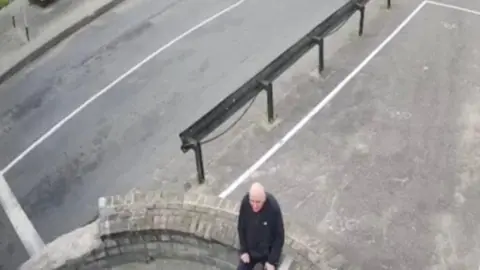 Reuters
ReutersIn reality she had no choice.
Veteran opposition politician Mikola Statkevich got off Larysa’s bus and refused to cross the border. He has not been heard of since, and it is assumed he was sent straight back to jail.
Mikalai Dziadok, a 37-year-old activist, spent five years behind bars and was marked with a special yellow tag, which meant tighter control and harsher treatment.
Yellow rather than white tags originally highlighted prisoners at risk of suicide or escape, so guards could keep a closer look at them.
But for Mikalai and others it was used for political prisoners deemed “prone to extremism”. Thousands were sent to jail in the weeks and months after Lukashenko brutally suppressed mass protests in 2020.
Dziadok recalls how for months he was placed in solitary confinement with prisoners in cells on both sides shouting “insults and threats to rape, kill, and dismember” him.
“They banged their bowls against the wall for hours, day and night. They wouldn’t let me sleep; it was impossible to read, write, or even think,” he told the BBC.
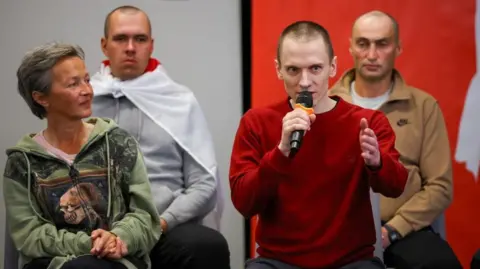 Reuters
ReutersDziadok is sure the prisoners were acting on orders from the guards.
“[The authorities] understood probably the overwhelming majority of us would sooner or later be released,” he said. “And if they had to release that person, it was necessary to traumatise him as much as possible so that he could not take part in political activity in the future.”
Solitary confinement is routinely used in Belarus as punishment against political prisoners for petty “violations”, such as not greeting the guards loudly enough. It is a way authorities put psychological pressure on inmates, say human rights groups.
Another political prisoner released in September, Dzmitry Kuchuk, said when he was in a solitary cell, the guards would torment him by falsely saying his mother had died or that he would soon be released.
The BBC has approached the Belarusian interior ministry for comment on these allegations but has not received a reply.
The solitary cells were tiny and freezing, said Yevgeny Merkis, a colleague arrested before Larysa Shchyrakova and who was released with her in September.
“The floor is tiled, the walls are cold, and in the winter, if the temperature is above -5C, they will open the window during the day,” Merkis told the BBC.
“You have a special uniform, and you can’t wear anything underneath it, no sweater, everything is taken away. At night, they unfold a bunk for you. It’s just a wooden board with metal edges.”
Mikalai Dziadok said he learnt how to exercise at night, half-asleep, to warm up. “My personal best is 300 push-ups and the same number of sit-ups in one night,” he said.
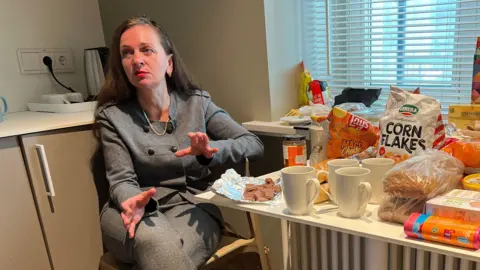
Larysa Shchyrakova was never placed in solitary confinement and could even take walks in the prison yard.
Her former colleague Yevgeny had heard her singing from his cell and managed to smuggle a message to her anonymously, scratched on the bottom of her bowl.
“I’m sitting there, eating my porridge, and then I see the word trymaysya,” she said.
It means “hold on” in Belarusian.
She had seen scribblings from prisoners before – on library books or a bench in the exercise yard. But this was in Belarusian, and immediately she felt it must have been written by a political prisoner, as they make a point of not using Russian.
When she had finished eating, she realised her name was scrawled on the bowl too: “Shchyrakova, hold on.”
It was clearly from someone she knew, although she had no idea it was her friend Yevgeny Merkis who had scrawled the message on the off chance she might see it.
“It inspired me so much. There was something almost mystical about it,” she said.
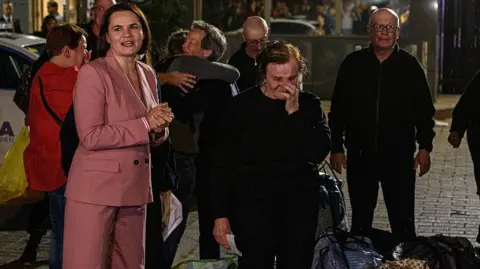 Anadolu via Getty Images
Anadolu via Getty ImagesTwo years later they were among the 52 political prisoners freed in September, amid a wave of pardons following negotiations between long-time Belarusian leader Aleksandr Lukashenko and Donald Trump.
In June, opposition politician Sergei Tikhanovsky – husband of presidential candidate Svetlana Tikhanovskaya – was freed. In July, another 16 were released.
Trump later referred to Lukashenko as “the highly respected president” – a diplomatic boost for a leader whose self-declared victory over Tikhanovskaya in 2020 elections has been rejected as “fraudulent” by the US, EU, UK and Canada.
In exchange for the September prisoner release, Washington has lifted sanctions on Belarusian airline Belavia, so that banks can unfreeze its financial assets.
But there is no move towards a wider political “thaw” in Belarus.
“In Belarus, everything goes in circles,” says Mikalai Dziadok. “After every wave of protest, round up as many political prisoners as possible, and then, little by little, trade them for a thaw in relations with the West.”
According to human rights centre Viasna, around 1,220 political prisoners remain behind bars.
The charges can range from insulting the president or taking part in an extremist organisation, to calling for actions that threaten Belarus’s national security.
Larysa Shchyrakova is now adjusting to her new life in Lithuania and everything she has, whether food or clothes, has been funded by the expat Belarusian community.
But at least now, more than a month after her release, she has finally been reunited with her 19-year old son.

